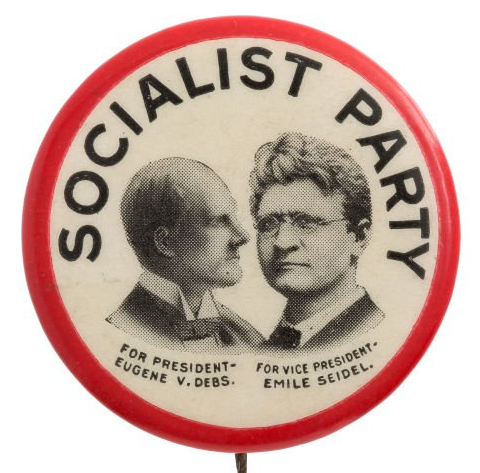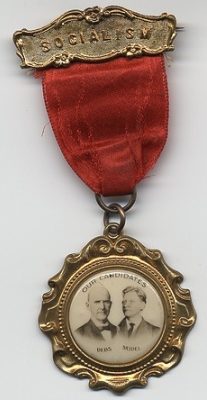Monday, June 17, 2019
Emil Seidel
Emil Seidel, December 13, 1864 (Ashland, Penn.) – June 24, 1947 (Milwaukee, Wis.)
VP candidate for Socialist Party of America (1912)
Running mate with nominee: Eugene V. Debs (1855-1926)
Popular vote: 901,551 (5.99%)
Electoral vote: 0/531
The campaign:
"This is our year," declared Eugene Debs in 1912. And he was right. In electoral politics, the Socialist Party of America would never have a better year.
The SPA had been rocked by conflict within the Party. This organization consisting of mostly white males had schisms on issues like the role of women in the SPA, immigration, and race. They also had a left/right split on the IWW and whether or not to engage in outright class struggle or work from within the capitalist system for reforms.
The right wing of the Party, called "Sewer Socialists," made a strong bid for the presidential nomination to displace Debs, who had already been the nominee three times. Their mistake was running two candidates against Debs instead of one, splitting the votes of the Convention's conservatives. One of those failed challengers was Emil Seidel, who was then made the VP nominee.
There had been previous Socialist mayors in America, but Seidel was the first one from a major city-- Milwaukee, Wisconsin, elected in 1910, but defeated for re-election in early 1912.
The 1912 platform included many ideas that have since come to pass, illustrating that even though the party itself splintered and diffused at least their ideas endured and were absorbed by the mainstream political entities. But there were also several planks that have yet to happen, including:
The abolition of the Senate and of the veto power of the President. -- The election of the President and Vice-President by direct vote of the people. -- The granting of the right of suffrage in the District of Columbia with representation in Congress and a democratic form of municipal government for purely local affairs. -- The extension of democratic government to all United States territory.
This was the last presidential election to date where four candidates received more than 5% of the vote. The Debs/Seidel ticket placed a solid fourth with 5.99%. On the ballot in all 48 states they placed second in Florida, and third beating the incumbent Republican Taft in Nevada, California, Louisiana, and Mississippi. Their best showings were in Nevada (16.47%), Oklahoma (16.42%), Montana (13.64%), Arizona (13.33%), Washington (12.43%), California (11.68%), and Idaho (11.31%). They actually carried two counties in Minnesota and a county each in North Dakota and Kansas.
And all of this while an even more successful third party was upsetting the status quo. The election of 1912 must have been Heaven for the politicos of the day.
Election history:
1902 - Governor of Wisconsin (Social Democratic Party) - defeated
1904-1909 - Alderman, Milwaukee, Wis. (Social Democratic Party)
1908 - Mayor of Milwaukee, Wis. (Social Democratic Party) - defeated
1910-1912 - Mayor of Milwaukee, Wis. (Social Democratic Party)
1912 - Mayor of Milwaukee, Wis. (Socialist Party of America) - defeated
1912 - Socialist Party of America nomination for US President - defeated
1914 - Mayor of Milwaukee, Wis. (Nonpartisan) - defeated
1914 - US Senate (Wis.) (Socialist Party of America) - defeated
1916-1920 - Alderman, Milwaukee, Wis. (Nonpartisan)
1918 - Governor of Wisconsin (Socialist Party of America) - defeated
1932-1936 - Alderman, Milwaukee, Wis. (Nonpartisan)
1932 - US Senate (Wis.) (Socialist Party of America) - defeated
Other occupations: woodcarver, pattern-maker, spice mill worker
Buried: Lincoln Memorial Cemetery (Milwaukee, Wis.)
Notes:
The victor in his 1902 race for Wisconsin Governor was Republican Robert M. La Follette.
Although the Socialist Party of America had changed their name from the Social Democratic Party, in
some jurisdictions the old moniker was still on the ballot for several elections.
Son of German immigrants.
His family moved from Pennsylvania to Wisconsin in 1867.
Lived in Berlin ca. 1886-1892 to learn the art of woodcarving. Became a socialist during this period.
Married in 1895, divorced in 1924.
Originally joined the Socialist Labor Party but was part of the great split ca. 1899.
Operated in Redmond, Washington as a SPA official in 1901.
While Mayor, the poet Carl Sandburg was his secretary.
Arrested Nov. 12, 1917 in Horicon, Wis. for making an anti-war speech.
Enjoying creating paintings, writing poems, and composing music.
The burial place of his cremated remains were unmarked until a volunteer effort was made to place a
marker there in 2017.




















